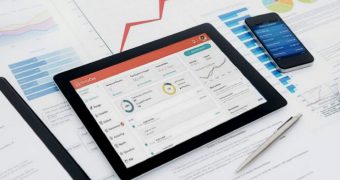Improve Your Property Management Accounting
What’s the big trend in accounting for property management in 2023?
It has to be using a SaaS-based property accounting system to automate and avoid the common, disruptive mistakes in accounting that typically happen.
The key idea today is that accounting is a vital business asset, which drives better performance, not just filing receipts and balancing the books.
And any mid-sized property manager must optimize accounting with a dedicated accounting software solution due to the sheer volume of transactions where errors multiply.
Dedicated Accounting Reduces Errors & Improves Reporting
Landlord owners, tenants and the government expect flawless bookkeeping and accounting. The expectations bar is set high now, and generally most digital systems help to keep embarrassing mistakes to a minimum. Certainly, with IRS audits becoming more likely, errors will be discovered. More to our point here though is that off-the-shelf business accounting solutions simply can’t keep up to the demands of a growing business.
If you’re using Quickbooks, Xero or Zoho, you won’t enjoy property specific functionality to attribute expenses accurately and create reliable reports. You can’t integrate with rent payments, bank accounts, rent reminders, maintenance activities, vendor invoices, etc. And it’s the same for HOA and Community association management. And it affects your confidence.
You’re not a dentist, clothing retailer, or restaurant manager, you manage rental properties and need industry specific features and functionality. Without it, errors flourish.
Dedicated and Integrated

Manage Recurring Expenses/Payments with ManageCasa.
Accounting software integrated with all areas of property management makes it more powerful and effective.
Increasing government regulations, higher taxes, rising interest rates, untrained staff, and more pressure to limit your biggest costs — taxes and wages, all require better accounting.
Top 25 Errors in Property Accounting
Here’s 25 common accounting errors made by property managers and landlords.
- not being real time in managing accounts and thus not keeping expenses up to current date, and instead of waiting till the end of the month or year
- failing to accurately record or update property information, such as expenses, depreciation, and material improvements
- not using a professional grade property accounting software (integrated) and instead, keeping accounting separate via an off-the-shelf general small business accounting software (which may make auditors suspicious)
- creating errors with manual data entry on daily individual transactions
- failing to record capital expenses to offset capital gains taxes
- disbursing funds before the receivables transactions are completely finished
- not calculating depreciation correctly
- misplacing/misfiling paper receipts/invoices in filing cabinet
- spending too much time on manual bookkeeping activities and accounting work — instead of relying on smart automation to cut down repetitive tasks
- failing to reconcile property records with physical inventory, causing inaccurate asset valuations
- recording duplicate or erroneous entries, such as double-counting purchases or expenses
- not properly accounting for property taxes, insurance, and other expenses that come with managing rental houses or apartments
- not properly accounting for leasehold improvements or other property-related expenses incurred by tenants.
- failing to comply with Federal, state or local regulatory and legal requirements
- not following trust accounting rules
- not sending security deposits to former tenants on time
- depositing money into the wrong account
- not making HOA/Community association payments on time
- not optimizing accounting processes before scaling up with new properties
- insufficient data backup of all accounting information
- weak, time consuming account reconciliation and bank reconciliation
- lack of internal audits to catch errors earlier and definitively before they cause trouble
- not using lease-based accounting to automate recurring costs and expenses
- not taming the complexity of data, expectations, rules and daily transactions
- using a general business accounting software package on the side (not integrated into everyday business activities, property accounts and transaction management)
While not an exhaustive collection of property accounting errors, the above list serves the point that automating accounting with a solution dedicated to property management is a wise decision. It’s an investment in efficiency, profitability and confidence in your business.
Automate Streamline Optimize
Modern property accounting systems streamline, automate, optimize and remove the friction and worry of accounting. The sooner property managers integrate property-focused accounting into their tech stack, the better.
ManageCasa’s property accounting system is one of its strongest platform features. You’re looking for a professional level accounting solution that helps prevent mistakes and that’s ManageCasa’s forte.
Get deeper insight into ManageCasa’s accounting solution. Schedule a Demo.
Selecting Accounting Software | Property Management Accounting Software | Real Estate Accounting Software | Simplifying Accounting for Rental Properties | HOA Accounting Software | Property Accounting Software | Accounting and Cost Control | Accounting and Taxes | Property Accounting Books | Property Accounting Statements | Download Landlord Guide | Automate Rent Payment | Property Software








